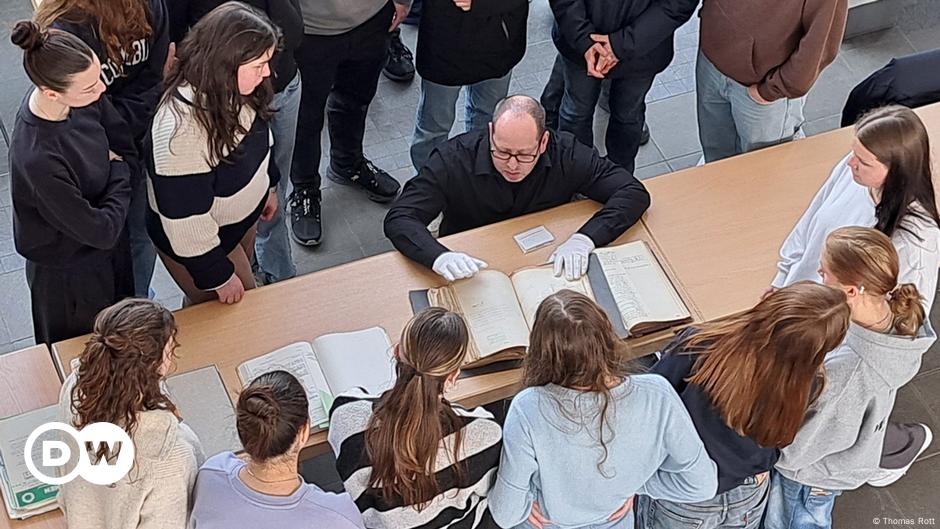
A few months ago, during a history lesson at Bad Honef’s Seven Mountains High School, the 10th grade class came up with the idea of making history themselves. By submitting the proposal, the class wanted to ensure that the city of 25,000 inhabitants in West Germany officially renounce one of its honorary citizens, the Nazi dictator.
Speaking on behalf of the class, five students, Kathy, Lily, Ronja, Mia and Celine, along with their teacher Thomas Roth, wanted to make a clear statement against right-wing ideas. “We live in this city, so, of course, its history also concerns us. And then we asked ourselves if we can use our influence today to change anything about history and Hitler’s honorary citizenship. We were also introduced to the topic by our teacher, and then each of us just wrote an email to the mayor,” they said in a statement.
His initiative resulted in a petition that was eventually signed by more than 1,363 people – 5% of Bad Honeff’s residents, and therefore the number needed for the city council to vote on the initiative. It was a huge success for the students who collected signatures, rang countless doorbells and educated the public.
“Most of the people we spoke to knew nothing about Hitler’s honorary citizenship, and many signed immediately,” the five students said. “If someone had told us a year ago that we could achieve something so big as a small school, we would not have believed it. But more and more, especially on social media, and we have to fight it.”
Hitler was an honorary citizen of 4,000 German cities
Bad Honnef made Hitler an honorary citizen on April 5, 1933 – a month after the NSDAP’s victory in the Reichstag elections. The small town was one of the first to take this step, and by 1934 a total of 4,000 towns and cities had done so.
Although the Nazi dictator’s honorary citizenship automatically ended with his suicide on April 30, 1945, Bad Honnef has not officially revoked it to this day.
Mayor Otto Neuhoff was visibly pleased with the students’ commitment.
“We are proud of the students, it is a great initiative,” he said. “They have also learned that change is possible through participation in politics. And because they have learned that you are not a victim of anything in a democracy, but you can get involved and have a say in how things are run at the municipal level.
Coming to terms with history
In recent years, many communities have taken the step of distancing themselves from Hitler as honorary citizens – mainly as a sign against social and political shifts to the right. According to Thomas Schlemmer, a historian at the Institute of Contemporary History Munich-Berlin, this reevaluation of history in Germany occurs in waves.
Started directly after the end of the first wave. “In 1945 and 1946, we were faced with a breakdown in the political system, with the Allies in turn, but also with a widespread need for a political elite,” he said. “This was accompanied by the renaming of streets and squares — hardly a municipality without an Adolf Hitler street or square. However, in the immediate post-war period this anti-Nazi impulse died down more or less rapidly between 1948 and 1950.”
Then, Schlemmer said, there was a perpetrator-victim reversal in Germany. Many of those responsible for Nazi atrocities suddenly saw themselves as innocent people who had been persuaded by a small group of Nazi criminals around Hitler to do things they really didn’t want to do.
Germany held off on reassessing its own history for decades. “But at the same time, the debate about the Nazi past was given a new impetus with the broadcast of the US series in January 1979. Also known as the New History movement,” said the historian. “A combination of academically trained historians and ordinary people like school children and teachers suddenly want to know how the Nazi era unfolded in our country.”
Makes an important first step
This period also saw Bad Honeff’s first failed attempt to rid itself of its notorious honorary citizen, 40 years earlier. Now, 91 years after receiving the honor, the town finally wants to end this unpleasant chapter.
For Schlemmer, it is an overdue step with great symbolic value – and an expression of a process underway across Germany.
This article was originally written in German.
While you’re here: Every Tuesday, DW editors catch up on what’s happening in German politics and society. You can sign up for the weekly email newsletter Berlin Briefing here.
Post Students want to strip Adolf Hitler of honorary citizenship appeared first German wave.
